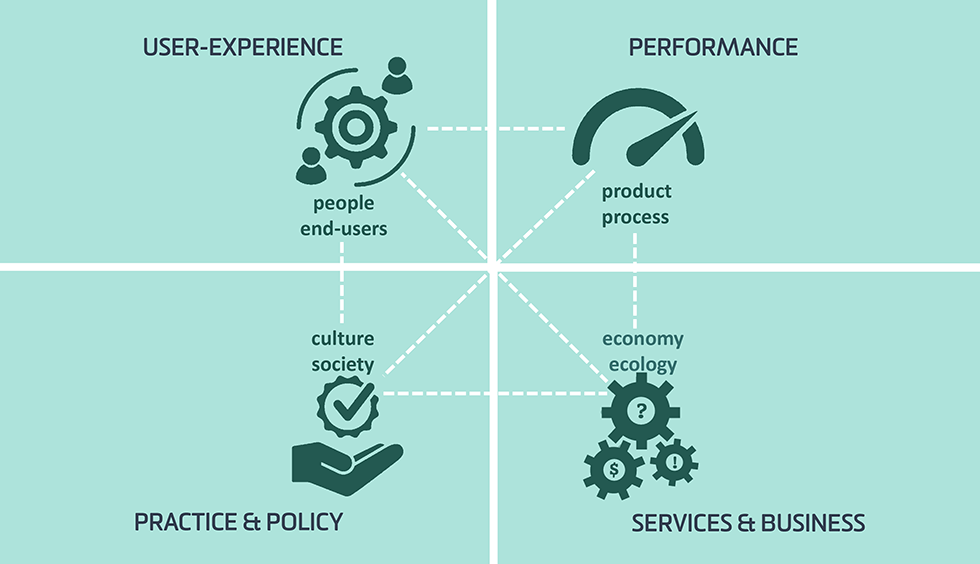Interested in research-level study?
Our researchers explore the role of architects and built environment professionals in shaping the future at a time when digital technology and innovations are disrupting the ways we think, live, work and do business. We also look at ways of adapting the sector's methods of approaching problems, to make an impactful contribution to a socially, economically and environmentally viable future.
Need a supervisor? We can help you find someone suitable across our mix of disciplines and research themes of architecture, planning, urban design, landscape architecture and construction management.
Find out more about becoming a research student with us
Our design framework
Embracing industry-driven, practice-based, and applied research, we have developed a transformative research framework – the Integral Design Framework (IDF) – to identify where we can effectively create impact.
The four areas of impact for the architecture, engineering and construction sector that we have identified for improvement through our research include the following.

Products and processes: analysing and improving performance (e.g. around products such as buildings).
People and end-users: improving user experiences through new interactions between people, information, buildings, spaces, and technology.
Society and culture: developing new policies and practices to improve how society and culture operate.
Economy and ecology: developing new services and business models that work within current economic and ecological contexts.
Our researchers also explore the interdependencies across these four areas, with our knowledge and research output often living at the intersection of these ideas.
Research laboratories
MInD Lab
The MInD (Mediated Intelligence in Design) Lab is a practice-based and trans-disciplinary research group based in the School of Architecture and Built Environment. The Lab explores how design and technology can innovate for an agile, adaptive, responsive, and intelligent ecosystem.
Through close partnerships with industry and research networks, including the Resilient Urban Ecosystem (RUE) network and the European Institute of Design, MInD Lab researchers explore new models of imagining, creating and operating for a socially inclusive, and economically and environmentally viable built environment.
Learn more about the MInD Lab including current projects
HOME
HOME is a research centre with a single core aim of a home for all. Bringing together experts from architecture and urban planning, the humanities and social sciences, and health and social development, HOME seeks to address the causes and outcomes of social polarisation in the built environment.
Architecture Vacancy Lab
Architecture Vacancy Lab examines gaps in the knowledge and creative practice of architecture and architectural education. Vacancy evokes an approach to this research focus: poetic, practical, provocative and intellectual, with an aim for an intensity of architectural intent. Research projects loosely align with three focal areas in vacant spaces, critical vacancy and research-teaching openings.
Learn more about Architecture Vacancy Lab
Data Analysis and Modelling in Construction Lab
The Data Analysis and Modelling in Construction Lab is a hub for research that focuses on innovative quantitative methods for measuring, assessing, analysing, optimising, and modelling the processes and products of construction. It also examines how these relate to society, the economy and the environment.
The Lab is committed to discovering new knowledge and interpreting facts relevant to construction and related subjects based on systems theory and quantitative computations providing a holistic view of complex and dynamic research issues.
Learn more about the Data Analysis and Modelling in Construction Lab
Research groups
Megaprojects Research Group
The Megaprojects Research Group is an industry-informed and multidisciplinary research group dedicated to harnessing interdisciplinary perspectives to advance the delivery of major infrastructure projects through innovative research and transformative evidence-based insights. We strive to empower decision-makers with evidence-based insights for strategic infrastructure planning, management and delivery. Through rigorous research, active engagement and innovative methodologies, we strive to generate actionable insights that can contribute to improved project outcomes, informed decision-making, and sustainable major infrastructure appraisal and delivery.
Learn more about the Megaprojects Research Group
Transport Futures Hub
Transport infrastructure projects such as road, rail, roads and bridges play a pivotal role in driving economic productivity, fostering connectivity, and generating fresh job prospects. These projects are the lifeblood of economic prosperity and development. At Transport Futures Hub, we focus on topical and impact-driven research in transport infrastructure, fostering innovation and collaboration to shape the future of transportation. We are multidisciplinary, with our experts drawn from engineering, construction, management, business, economics and political studies.
Associated research projects
Growing Up In Cities
Growing Up In Cities (GUIC) is a globally expansive research project examining adolescent's perceptions of contemporary urban spaces to better understand the impact the local environment has on their lives.
Contact us
Associate Head of School, Research
Dr Dominic Doe Ahiaga-Dagbui
Ph: +61 3 522 78074
Email Dr Ahiaga-Dagbui
